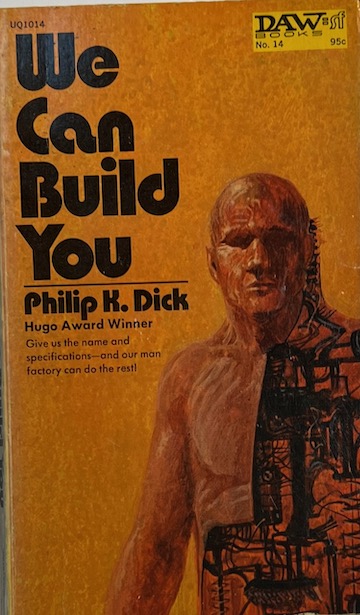Part 11 Philip K Dick 1971 Interview

James Holmes: Do you think there are gonna be any science fiction pulp magazines in the future? Do you think they are declining?
Philip K Dick : I think that the written word in many ways is declining as such, thank God, because the written word is artificial compared to the spoken word. Going back to television in a way is not going back to passivity and mere passive acceptance of what is thrown at you. It’s going back more to the spoken thing.
James Holmes: Uh hmm.
Philip K Dick: And, that’s not bad. I mean, script writing is basically dialogue writing. If you look at a TV– Well, like I said before, I can hardly fathom the camera stuff, but a TV script is very much like a radio script in that it relies primarily on dialogue, which means spoken language, and that, I think, is an improvement. To me, not only can everything be done in dialogue, everything should be done in dialogue, if it can be. It’s not proper. I mean, it’s not essential. It’s not the essence of the thing. Look at, for instance, Ibsen’s Ghost or Ibsen’s Doll’s House or the Master Builder. There isn’t anything that he can’t do as far as I can make out, and in Peer Gynt, he shows at the end of his life that he can even transcend the realism of the bourgeois frame of reference. He can go into a very mystical metaphoric religious-type thing, still within the framework of dialogue. “Hey man, here comes the button molder, what’s he got to offer?” And then Beckett picks it up like in Godot All That Fall; very transcendent, very mystical things, but done in dialogue. All That Fall is remarkable. Are you familiar with that?
James Holmes: No.
Philip K Dick: That was written for the BBC Radio. It was written to be given strictly as a radio drama. There is no drama cast production. There is no visual All That Fall. It’s only available on the pages of the Evergreen Press book. There is no other All That Fall except the tape of the production over the BBC, which I have. It’s marvelous, but it’s strictly spoken, strictly oral. The greatest dramatic moment is when he says to her when she has this apotheosis, “You are quivering like a blancmange,” and it conveys everything. Like, resurrection, death, something about a chicken lying in the road taking a dust bath; a car comes along, one squawk, one fuss of feathers and it’s all over, and this is, you know, all there is, but everything on the theme of death and rebirth is contained in it. If I could recall it, it would be as good as Beckett. It’s there in the script. It’s a beautiful play. Unfortunately, my tape ran out before it ended, so I don’t know if there was rebirth or not. I just got to the “fall” part.
James Holmes: [laughing]
Philip K Dick: I think there was rebirth. That comes on the next reel. I was changing tapes when it finished.
James Holmes: What kind of criticism has been leveled against the books that you’ve written, off-hand?
Philip K Dick: That–
[laughter]
Philip K Dick: How much time do we have now?
James Holmes: Oh, you’ve got hours.
Philip K Dick: That’s what I was afraid of. Well, let’s see. We will take it in order of descending importance – that they’re morbid, that they deal with delusional psychotic states, that they are not transferable to other peoples’ mentalities; I mean, they’re, you know, so subjective that they’re relevant only for me, that nobody can understand them, and they don’t like them either. Not only did they not understand them, they don’t like them and they don’t approve of them, and it’s been done before, and not only has it been done before, it’s been done better, that it is more incomprehensible and more psychotic, I guess; and third, it’s dirty or it isn’t dirty. I don’t really know. See, the criticism of my stuff is usually too complicated for me to understand both pro and con. I mean, I start reading it and he starts talking about the meaning that I have in my books, the message, and when I get to that, I literally can’t figure out what he’s saying, and I start skipping paragraphs and I start skipping pages, and then finally– Like, there was one article in an Australian magazine that ran 25 pages – that was just one section – there were three sections, and I skipped the whole middle section. Then, I read the third section, and I couldn’t figure out what it was talking about, and he’d quote passages, and I’d read the passages from my books and I couldn’t figure the passages out. He said, “Now you see, here he talks about the identity between all men…all men are really one man,” and then he’d quote some dialogue. I’d say, “My God, I can’t figure out what that dialogue means,” and then I’d stop reading it entirely, and that’s true of both positive and negative criticism. If it’s profound criticism, I can’t figure it out. I just say, “Gosh, I must be really good. This guy spent 25 pages attacking me as the enemy of civilization.” This other guy says I’m the hope of civilization. I mean, I’m gonna mail the reviews to each other, and you know, slip away, and all the criticism has been, as far as I can make out where I could distinguish the meaning, irrelevant and not germane to me to what I was doing, with one exception; one or two sentences and one mimeograph thing like I did seem to relate to what I was doing, did sum up what I was trying to do.
James Holmes: What was that?
Philip K Dick: I don’t know. It’s in the desk somewhere.
James Holmes : [laughing] Oh.
Philip K Dick : If I tried to find it, I probably couldn’t. Something about– Well– Why don’t you turn that off for a second. This is a thing called Sunshine 24, and it’s mimeographed, and it’s so badly mimeographed that half of it you can’t read, and I don’t know who puts it out, somebody called the Latrell Family and I get these strange things all the time. It turns out it has to do with a science fiction class somewhere where they teach– Their booklets is what they call the ten best science fiction novels ever written. There are mentions of me here somewhere; this one thing. The author, speaking of me, is mainly interested in examining the small but noble gestures of belief, faith and trust, which is all that man can do to cope with the universe of chaos, and that seemed like, you know, that made some sense. Like, it doesn’t really matter whether people like what I write– or don’t like what I write, because that has to do, like, with response in a sense, you know, of approval or disapproval; that determines the sales, that determines the prestige. It’s whether they are getting out of it something– not even necessarily what I intend for them to get out, but something that– to go back to Aristotle’s theory of tragedy– It ameliorates their condition or their ability to deal with their condition in some way, which I wouldn’t call positive. You know, like, it makes them better people. I wouldn’t say that, but– It’s always disturbed me that people have talked of my stuff as being a thin film of reality over a seething chaos of psychotic horror that breaks through from time to time and drenches and overwhelms the individual. This sort of thing has worried me because this is not really what I’m talking about. I’ll buy this chaos thing. Like, you know, I don’t understand the universe at all, and it doesn’t understand me, you know, which is okay, but like, to me, I never thought of it this way– the small gestures of trust, faith and belief, but if somebody sees that in my writing, at least that offsets the possibility that I’m only conveying a view that the universe is basically a seething mass of hideous frightening evil with a thin skin of common place, things over the top. That is not what I mean to convey. If I thought that, I would just get a large can of insecticide and spray the universe with it. I wouldn’t write books. You know, I’d direct my attack on the universe. My writing is directed at people, because, you know, like, I believe in people. I mean, these people are gonna buy the books. When the universe gets some money, then I will direct my books at the universe. It makes me mad when I think about the seething cauldron of psychotic horror that the universe is supposed to be. I just pose it as a kind of chaos, and I don’t understand it, but who can understand chaos? It’s like in Kafka. I mean, he can’t figure out what’s going on, and the people that are coming to get him can’t figure out what’s going on. Like, in the Castle– He’s been hired to do a job. He arrives, can’t get in the castle, can’t get them on the phone; when he does get them, they can’t figure out who he is. They don’t know who he is either. They said, “Did we hire you?” He said, “Yes. I wonder what for?” They are as puzzled as he is. Now, if they had a sinister conspiracy going, they would say, “Ah ha, we’ve got you in the inn. Try your door. It won’t open. Now your whole room is gonna self-destruct.” That’s not what happens. They can’t figure out why he’s there, “Why did you come here?” “Well, you hired me.” “Well, we’ll send you a check.” I mean, the universe is gonna have to mail him a check every month on the assumption that he’s working for them. It could be that way, too. It’s not necessarily a seething cauldron. Why is this microphone trying to grasp me by the throat and strangle me?
James Holmes: Is there–
Philip K Dick: I did write stuff like that for a while where microphones did that. I didn’t get interviewed. The people didn’t bring their microphones around.
James Holmes: Is there any good criticism?
Philip K Dick: What do you mean?
James Holmes: Well, you know–
Philip K Dick: Helpful to the writer?
James Holmes: Yeah, helpful to you, or–
Philip K Dick: Yep.
James Holmes: You know, stuff that you could learn from.
Continued in:
Part 12 Philip K Dick 1971 Interview

